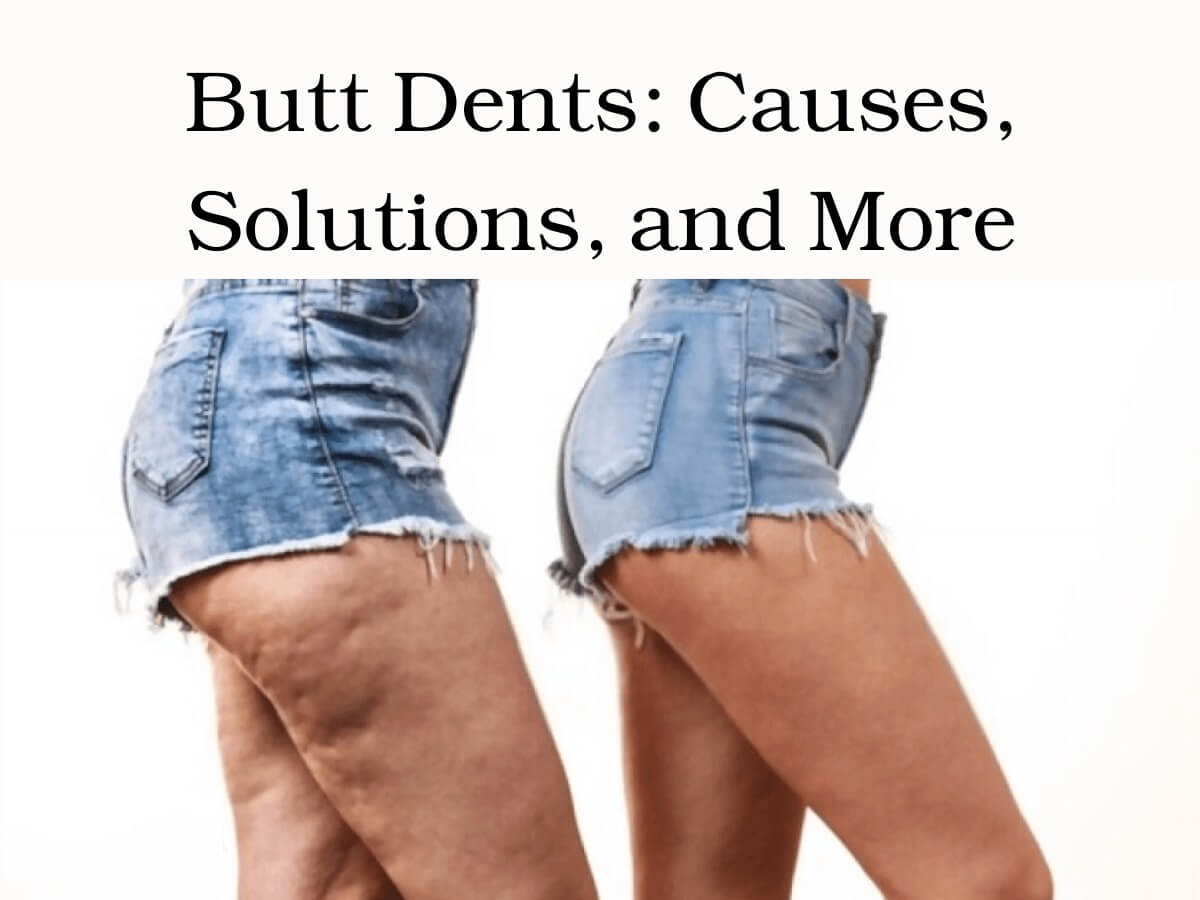What are Butt Dents? Causes, Solutions, and More

You’ve probably spent many hours in front of the mirror examining your butt’s dimples. Do not be concerned; these dents are pretty natural and are more prone to occur in females. This article will explain the causes of butt dents, several solutions, and almost everything you need to know about them.
What are butt dents?
Butt dents are little lumps and bumps that develop in places on your body, like your hips and butts. They are also known as orange peel and cellulite. According to a study review published in Pub Med, 80–90% of women may have glutes at some point in their life.
Although the dents can also afflict men, they are more common in women since, as a result of their estrogen hormone, women tend to retain a lot of fat in their butts.
How do these dents occur?
As it stands, the leading cause of the dents is the fat that your body stores around your butt due to the estrogen hormone. These fats will be wavy by pushing through the connective tissue under your skin.
Fat deposits under your skin are what lead to butt dents. In contrast to other women, some are typically predisposed to it. Your age, body fat percentage, skin thickness, and genetic makeup can all affect how much of a dent you have and how obvious it is.
Because women’s body fat distribution is more evident than that of men, women are more prone to sustain butt dents.
The bumps you notice in front of your mirror are caused by the collagen fiber that divides the underlying fats into numerous pockets between the skin and muscles.
You should be aware that your age is mainly related to butt dents. How? It is because as you age, your dents will become more apparent. It is usual for your skin to grow less elastic as you age. It will further reveal the problem with a cascading effect under your skin.
Causes of Butt dents
Well, the precise reasons for the dents are still unknown. The butt layer’s connective tissue and fat cells are arranged vertically, making them more prone to dents than men’s crisscross-shaped tissues. The following are elements connected to the development of butt cellulite.
Age
You will see more cases when a person enters his seventies, particularly in regions where butt dents are most common. However, estimating the degree and frequency of butt dents as people age might be challenging.
Many older adults appear to be utterly devoid of them. In older people, increased muscle blood flow might cause a brief syndrome incidence. However, the issue is resolved as soon as a typical drop in blood pressure returns to the increased blood flow.
Hormones
Butt dents could appear right before menopause due to the increased blood flow to the skin. It’s also possible that the increased frequency of butt dents is caused by hormones generated during this period. According to one idea, estrogen causes the blood arteries to enlarge, which raises blood pressure. Muscles may contract as a result, which may cause the skin to wrinkle more.
Injury
Another explanation is that trauma led to the development of butt dents. Direct skin damage might result in butt dents because it increases blood flow to the area.
This quick flow causes the muscles that generate wrinkles to contract, which causes new wrinkles to develop on the skin. Butt dents are not just a symptom of aging; in some cases, injuries like fractures or sprains can cause butt dents to appear. In this situation, increased blood flow to the region could cause the development of a butt dent.
Genetic Factors
As people get older, some start to have butt dents. In other words, they come with them from birth. An innate propensity is another term for it. However, no one is aware of what gives rise to or makes this inclination occur, and there is no means to stop it. Although a person’s genetic makeup cannot be changed, their surroundings can be altered to lower risk factors.
Lifestyle
Certain lifestyle choices can speed up the development of butt dents. In the past, when people lived in darker homes, employed potent sunscreens, and did not wash with soaps that were as effective at cleaning the skin, the appearance was more dominant. In this case, they did not clean them well, and a buildup of soiled material may stay on the skin for a more extended period.
Butt dents may form due to a filthy layer on the skin. If you don’t wash your hands with soap and water daily, greasy filth can accumulate on your skin.
Diet
An imbalance in the supply of sulfur and biotin typically causes a butt dent in a person who consumes a nutritious diet and an adequate amount of critical vitamins and amino acids. The production of Keratin, the primary structural protein of human skin, requires the two necessary substances.
Why Do Women Get Dents in Their Butt?
A network of capillaries and lymphatic vessels replaces the buttocks’ fatty tissue in healthy women. These veins deliver fresh nutrients to the skin and drain contaminants.
After menopause, a decreased estrogen level may result in less fat being supplied to the area, which may lead to the breakdown of the fat underneath. The skin won’t effectively replenish itself because there aren’t as many vessels to carry nutrients to the skin.
The skin will be dry, but because the collagen fibers are still flexible, they can stretch to follow the body’s curvature. After menopause, this is the reason why some people get butt dents.
How to Remove Butt Cellulite or Butt Dents?
There are numerous methods for removing dents from the buttocks. The following are a few sustainable strategies to stop the growth of cellulite ass:
Exercise
A few researchers have discovered a link between physical activity and enhancements in skin quality. Similar to lowering stress and boosting happiness, physical activity also improves skin quality.
Diet
Does the food you eat have any relation to your butt dents? Your diet plays a variety of responsibilities in the body. The factors that support the health of your skin and blood flow may also affect how likely you are to get buttock dents.
Blood Circulation
The therapy for buttock dents known as “dynamic taping“ benefits from the idea that heat can increase blood flow to the skin. The patient is placed on a pad bathed in warm water after any irregularities in the dead skin have been removed with a mild disinfectant. Three treatments spread out over three week’s total of a 10-minute procedure.
Hydration
Drinking adequate water is a great way to reduce dry skin. It is easier for the body to retain moisture with enough water. If you have dry skin, you should consume 8 to 12 glasses of water daily.
End words by the writer
There are numerous disputes on how the dental butt develops in the body, and various individuals have different views on the butt dent. The development of butt cellulite is directly correlated with diet, genetics, lifestyle, and activity.
The probability of butt dents can be decreased by looking out for these causes and avoiding the other known ones that cause the formation of a butt dent. Despite the lack of an apparent reason, older people are likelier to have butt dents than younger people.
Frequently Asked Question (FAQ’s) about Butt Dents
What causes buttock dents?
Increased fat cells press on the skin. Connective cords that are strong and lengthy pull down. Cellulite is a term used to describe the uneven surface or dent caused by this. The thighs, hips, buttocks, and abdomen can develop lumpy, dimpled flesh due to cellulite, a relatively common, innocuous skin condition.
How can I get rid of cellulite?
Even while it’s hard to eliminate cellulite, there are steps you may take to lessen its visibility. Strength training can help slim down the body and sculpt the muscles, erasing some butt dimples, especially when combined with diet and exercise.
Do squats increase your butt size?
All the glute muscles are worked together during a squat. Hypertrophy can be induced by carefully selecting specific muscles to recruit and tax (or muscle size growth). Squats can therefore help you develop more giant glutes.
Can cellulite be removed with massage?
Cellulite is reduced, and lymphatic drainage is improved by massage. It lessens cellulite and aids in expanding your skin’s tissues.
What’s the name of the butt dents?
A butt dent is a tiny lump that develops near the butt and heap. These are sometimes known as orange peels or cellulite.
References
https://www.nike.com/a/squat-benefits-to-your-body\
https://beautiquebeautiful.com/sculptra-aesthetic/
https://www.healthline.com/health/fitness-exercise/butt-cellulite
https://www.livestrong.com/article/292007-butt-dimples-exercise/
https://flabfix.com/butt-dents/
https://www.gym-pact.com/how-to-get-rid-of-butt-dents#:~:text=Butt%20dents%20are%20small%20indentations,to%20a%20much%20lesser%20degree.





